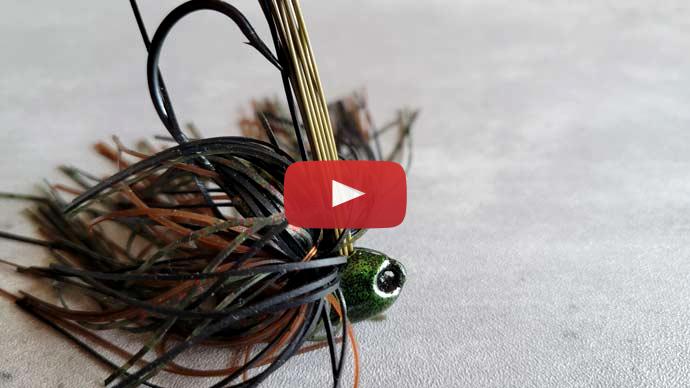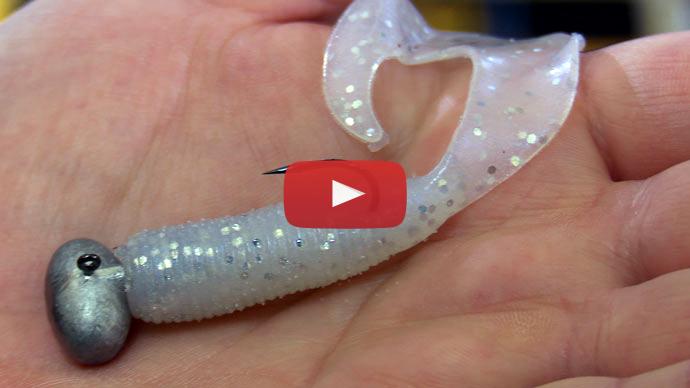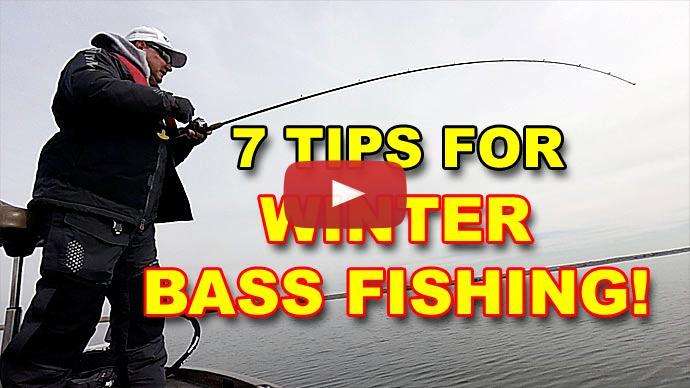Hey guys, Drew Cook here with BassResource and I want to talk to you about how I tackle fishing in the wintertime. This is a time that's really overlooked by a lot of people. A lot of people are in the woods. I'm guilty of it myself. But every year... Say you kill that buck right off the get go and you're tagged out, stuff like that. It's when you can go out on the lake and not have to deal with as many boats. A lot of people aren't on the water and the fish are really healthy.
You catch a lot of really big fish whenever it's cold and in the wintertime. You can find them deep, you can find them shallow. It's really fun and it gives you the opportunity to fish before you need to fish. So in the springtime, whenever you have all your tournaments, you don't want to be just remembering how to throw a baitcaster and things like that. This gets you into fishing shape and gets you more prepared for the rest of the season.
So, in the winter, I start off with the same thing I do every season. Everything revolves around where they spawn. Where bass spawn, you can always figure out where they are as long as you can figure out where they spawn. So they're going to be out from where they spawn, and as winter goes on, so from early winter, they're still far back in the creeks, and half of them are deep just chasing bait. Till late winter, they're going to gradually get closer to where they're going to spawn and where they're going to be in the spring. So whenever you find where they spawn, you can, I know it's like beating a dead horse, but that is probably, I think, one of the most important things at any time. Find where they spawn, you can work forwards or backwards from that.
So in the winter, you know, it's going to be cold. There's a lot of things that will deter you from fishing. You want to be warm. Just you personally, be warm. Pack a lot of gloves, things like that. Whenever they get wet, just take them off, put a new pair on. That's going to keep you out there longer and let you fish more.
You're going to be fishing. You can do a couple different things. You can throw a big jig deep, and when you get that bite it's just doong. You get to set the hook and stuff like that. Or you can fish up shallow. There's going to be a lot of fish up shallow where you're throwing a crankbait or a lipless, things like that around rock. You can get out there and, you know over a 100 foot of water if you have it and then catch fish that are spending the winter suspended on bait, you know Damiki rigging or you know throwing a... anything like that, you know, really finesse style. You can do whatever, you know, either crack them on 20 pound line with a big jig or catch them on 6-pound line on a spinning rod.
But a lot of those ones that suspend, it's all bait-oriented and you can't hold them accountable for anything. They can be here today, gone tomorrow. They're going to go wherever that bait goes. So it's really hard to fish a tournament whenever you have that because, more than likely, whenever you pull up somewhere, they're not going to be there. And then you're going to spend a lot of your day looking for them.
But the shallow, I love cranking shallow rock and wood and stuff like that. That's my favorite way to fish in the winter. That and flipping wood and rock. Anything that warms up. Boat docks are really huge in the winter. Especially the floating boat docks. The black pontoon or whatever floats that are on them, those things hold heat.
And when they hold heat, the fish really gravitate to them. And that's a fun way to catch them. Throwing a swim bait or something that you can skip underneath there. If you have to, you can throw a wacky rig and things like that. But those docks that hold heat is what the deal is.
And you'll find that they'll be a pattern inside a pattern, if that makes sense. So there'll be, say, in the last third of a ditch or creek or whatever, and that's the docks that they're on. But as you do it, for a couple days you find that they're in the last third on the docks that have jet ski platforms on the side. It doesn't sound like a difference, but it is different. It's just like there being big grass flat, and there's one patch of pads in it, that's different, and difference is what bass really key in on, and as an angler, that's what you should key in on as well.
And the holding the heat thing is the same as you move to a grass lake, flipping a lot of times that year, just in the thickest, nastiest stuff that you can find, grass that's getting beat on by the sun and holding that heat in. The water temp can be 58 degrees or 50 degrees, whatever, and then underneath that mat, it can be 3 or 4 or 5 degrees warmer.
And I know us, whenever you get into your house or whatever, whenever it's cold outside, whether you think about it or not, you get as close, you get close to that air vent that's blowing that heat out or the fireplace or something like that, and you don't really even recognize it. You don't walk in, and there's a fireplace across the room when you're cold and not walk over there and put your hands behind your back and do like this to get warm. That's the same thing these fish are doing. They can't stand it when they're...say, they're swimming along, and then they feel a little warmth. They're going to get over there by that thing and get up close to it and soak in that warmth.
Another thing about the winter is the metabolism of bass slows down, and metabolism is everything really when it's cold. But it's not like a bear hibernating. They're still going to eat. They got to. They just fed up so much in the fall. They've got enough to when their body slows down, they can kind of make it through.
But a lot of times, whenever you catch them in the winter, even shallow cranking or something like that, they're big. They've got little mouths and fat. Some of the biggest fish you catch all year are in the wintertime.
Clear water, spotted bass, lakes, you know, like a Hartwell or a Lanier or whatever. It seems like the wintertime is really good there, but those, the spots and stuff like that, they don't act like it's really winter. There's a lot of schooling that goes on. It's more bait-driven. They're like pack of piranhas. Whenever that bait gets out there, they just can't stand it.
And you'd think with it being so cold, the fish aren't going to be as active, not schooling, but on those herring lakes, it seems like that. The water temp really doesn't matter. Whenever you're fishing in the wintertime on a grass lake, it's gonna be flipping, but don't count out a buzzbait. Some of the biggest bags I've ever caught in the wintertime have been on a buzzbait. I didn't get but five bites, but they were all great big ones.
And I'm talking about in the south where I live, 56, 57 degree and less water temperature. Whenever...it doesn't ever get down there, but I'd say 45 to 60, you can throw a topwater. You're not gonna get that many bites, but there's something about that topwater that really gets a big fish.
I've had it where you're throwing a lipless, and your bait gets fouled up, and it runs sideways on the surface. It's got a grass on it or something like that. I've had them absolutely clobber it. Oh well. Then you pick up a buzzbait or a Whopper Plopper or something and throw it and catch some of the biggest fish of the day. You're not getting many bites but still catching big ones. That's something to keep in the play.
You know, in the wintertime, in the south where I'm from, you never, never, never count out the influence of a spring, and this is from, I would say the Mason-Dixon line down. You know, a spring that has, you know, there's going to be warmer water then, and a lot of fish are going to congregate around it. Where, you know, like at a Guntersville spring, you know, you're going to catch them on lipless and a chatterbait around it. And you know, all the way down into Florida, you know, it can be December, just freezing cold, and you catch them off bed, you know, in the spring. Because they don't know any better. You know, the water temperature is right. It's the same thing that they look for all around the lake. But it's only in one place and you're going to have those resident fish that are going to spawn in there.
So don't not go shallow just because it's cold. Don't not throw a topwater just because it's cold. You know, you kind of got to keep it all.
Another tip that I do a lot in the in the winter, whenever, I mean, it's like really, really cold, I actually throw some mono. That's the only time besides throwing a small topwater, like popping style bait that I ever throw mono. I
'll throw mono on a spinnerbait, and I'll throw mono on a crankbait. And what that mono does is the ice, if your reels are icing and like your rod tips and stuff like that are icing, that mono is better at not getting little microscopic cuts in it to actually weaken your line. And it gives those fish extra time whenever they bite it.
You know throwing a spinnerbait on mono is something I've done...in the wintertime is something I've done for a really long time. It just seems like they need just a little bit longer. I'm already throwing it on a glass rod and things like that, but they just need just a little bit longer to be able to get that spinnerbait and that crankbait in there, in their mouth good.
Another thing to think about here, this is a way big rabbit hole. Their mouths are so hard in the winter from the cold, and I don't know if it's eating crawfish or whatever but their mouths are harder in the wintertime than they are in the summertime. So I use more round bend hooks on crankbaits, things like that, over EWG-style hooks. I do still use some EWG-ish style hooks like the Gamakatsu G-Finesse on lipless in the winter. But on my crankbaits, I like to use round bends, bronze hook, or G-Finesse hook. And that helps with your landing and your hooking ratio. You want something really small to get through there because that mouth is so hard. And that's just another little tidbit for you.
Another thing is whenever it does get cold, if you can, some of that line care stuff to spray on your reels really helps your line from not freezing in the actual spool. The eyes will still freeze, but not in the spool. Chapstick helps your guides. You see a lot of people that will dip their rods in the water. You're only solving that problem momentarily. By the time you get your cast in, they're going to be frozen again.
Before you get to fishing, you probably have to do it a couple of times a day. Take chapstick and put it on your eyes. It'll really help with that freezing, kind of globbing up on the eye. We don't have to deal with that a lot down where I live, but a lot of people that are watching this do, so that's just a little tip.
That's what I do whenever it comes to wintertime fishing, and I appreciate you all for watching.



